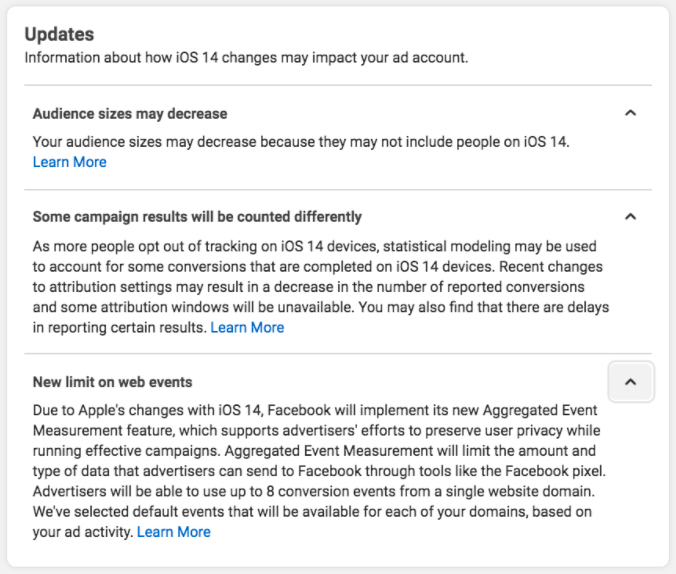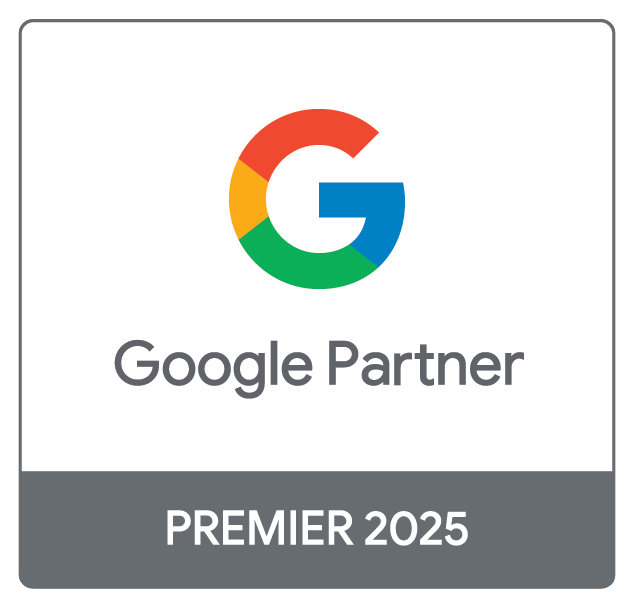You may have seen the bitter war between Apple and Facebook unfold over recent months due to the new privacy policy changes which will be implemented by Apple in their iOS 14 update this year. There’s a lot to unpack, so we’ve unpacked it - keep reading to find out what it all means.
So, what is the iOS 14 update?
The latest update will mean that many Apple users worldwide who update their iPhones to iOS 14 will be asked whether they want to opt-in to having their activity tracked. If they don’t opt-in, Facebook will be unable to gather information for personalised ads. However, users can still choose to opt-in if they wish to receive personalised ads.
Apple have made these changes based on the privacy changes they are making within their App Tracking Transparency (ATT) framework. Ultimately, Apple are trying to protect users’ privacy as more countries begin to place more importance on data security and confidentiality.
We believe users should have the choice over the data that is being collected about them and how it’s used. Facebook can continue to track users across apps and websites as before, App Tracking Transparency in iOS 14 will just require that they ask for your permission first. pic.twitter.com/UnnAONZ61I
— Tim Cook (@tim_cook) December 17, 2020
Facebook’s response
Facebook has provided a passionate response to the changes. Their worry is that most users will opt-out of tracking, decreasing audience sizes and ultimately negatively affecting their advertising platform. Facebook have argued that this will hit small businesses the hardest who have relied on Facebook advertising during the pandemic. The social media giant will be complying with the new rules in order to avoid being potentially blocked or banned by Apple; this would hit them much harder later down the line.
What are the changes affecting Facebook advertisers?
Changes to Advertising Reporting:
The changes have already been put into place for many ad accounts. Facebook has already created a resource centre in Ads Manager to help advertisers prepare for iOS 14 changes.
Advertisers have found that there are changes to how Facebook reports in Ads Manager, ad reporting and the Ad Insights API. One big change is that Facebook will be using statistical modelling for app installs results due to the iOS 14 update - this is known as Aggregated Event Measurement - to help report on event conversions.
The implications of this are that there will be delays to reporting of up to 3 days.
Here are the changes:
- 28-day click and 7-day view attribution will no longer be supported. However, 1-day click, 1-day view, and 7-day click will be available. We’ve seen most campaigns default to a 7-day click attribution window.
- There will also be reduced reporting for app and web conversions to delivery and age, gender, religion and placement.
- App install reporting will rely on Apple’s SKAdNetwork API for mobile app installs and app conversions. The data will be delayed by up to 3 days and statistical modelling might be used at the ad set and ad level, unless there is just one ad set and one advert.
- Statistical modeling is likely to be used for web conversion events too from iOS 14 users.
- The attribution window will be able to be changed at the ad set level rather than the account level.
Update from Facebook Ad manager:

Changes for ads for Apps
If you plan to deliver ads optimized for conversion events that occur in your business’ app, here are the following changes:
- Your app can only be associated with one ad account. You can use the same ad account to advertise for multiple apps.
- Each app is limited to 9 iOS 14 campaigns at one time, and each campaign can only have 5 ad sets with the same optimisation.
- The optimisation you choose for a campaign can’t change across ad sets.
- Reach and Frequency won’t be available; Auction is the only buying option for iOS14 users.
- There will be a 72 hour reset period when you turn off a campaign before it won’t count against your 9 campaigns limit. This is so that reporting will be more accurate, as reporting from Apple’s SKAdNetwork API could be delayed by up to 3 days.
- When you publish your campaign, you can’t turn on or turn off the iOS 14 campaign toggle. You’ll have to turn off or delete your campaign.
If your business has an App, this is how you can prepare:
- Update to Facebook’s SDK for IOS 14 version 8.1 - this will help to personalise the ads delivered to iOS 14 users, and you’ll also get app conversion events reporting. If you use the Facebook SDK for iOS but don’t update to version 8.1 or above, you won’t be able to run iOS 14 app install campaigns. Find out more here.
- Once you’ve updated to the version 8.1 you will need to make changes to your event configuration scheme in Facebook Events Manager; more info can be found here.
Here’s what you can do if you plan to deliver ads optimised for conversions on your website:
- Make sure you verify your website’s domain in Facebook Business Manager.
- You can set-up up-to 8 web conversion events per domain in facebook events manager. The new Aggregated Event Measurement limits to domains to just 8 conversion events, such as ‘purchase’, ‘add to basket’ etc. Facebook will be doing this for us but you can edit your conversion events selection in Events Manager. It’s good to know that ‘landing page views’ aren’t subject to the 8 conversion event per domain limitation. You can read more here.
If your business runs Facebook dynamic ads:
- If you use multiple domains within your product catalogue, you will need to verify each domain that you use for product URLs and avoid URLs that will redirect to another domain.
- Ensure that you’re only using one Facebook Pixel.
- Your Pixel will only be able to report on a max of 8 conversion events per domain. Facebook will be automatically setting up these conversion events that they believe are they most important for business - when you create your ad set you’ll have to choose from one of the 8 conversion events.
- Other events will be made inactive but you should be able to manage your preference in Event Manager.
These changes come to Facebook advertisers just after Facebook Messenger ads have been restricted in Europe. The Facebook advertising platform continues to be hit by privacy policies, and it will be interesting to see how Facebook innovates over the next year to adapt to these changes which will be affecting their bottom line.
